Research Round-up – November 2019
Welcome to the latest instalment of our new monthly feature series throwing the spotlight on our research success stories.
Two Leeds academics have been awarded £5.8 million to develop next generation drugs to help prevent blood clots

The strength of our research is in making a real and telling difference to the world around us, by working across traditional boundaries to find innovative solutions to some of the greatest challenges facing society today.
Here we highlight some of latest projects being pioneered by the expertise and efforts of the highly talented research community at Leeds.
From grant awards to examples of outstanding interdisciplinary work and best practice, we’re keen to showcase your research achievements. See the foot of this article for details of how you can get involved.
Featured in this month’s round-up:
- £5.8m funding to help prevent blood clots
- Astbury Centre opens its doors to European collaborators
- New research aims to delay progression of Alzheimer’s
- Funding secured to tackle liver cancer
- Grant will help investigate immunotherapy for liver cancer
- Leeds scientists lead next generation of radiotherapy treatments
- The power of a PhD
- National Pig Centre opens
- Drone wireless system helps rescue workers ‘see’ inside buildings
- Helping address global issues around sustainable food
- Can you tell ferntickles from branny-speckles?
- Taking stock of generic news images
- Research spotlight
- New award honours women in science
- Research Development Fund 2019 applications open
- Gale Digital Scholar Lab
- Be Curious 2020 – save the date; and
- How to feature in future round-ups.
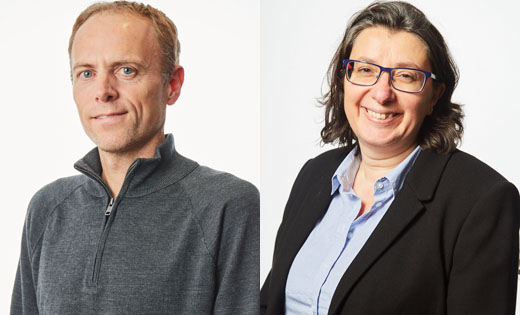 Innovate UK funding has been secured by Dr Richard Foster and Professor Helen Philippou to develop new anticoagulants
Innovate UK funding has been secured by Dr Richard Foster and Professor Helen Philippou to develop new anticoagulants
£5.8m funding to help prevent blood clots
Two Leeds academics have been awarded £5.8 million to develop next generation drugs to help prevent blood clots.
Anticoagulants are given to people at a high risk of developing clots, reducing the development of serious conditions such as strokes and venous blood clots (thrombosis).
Current anticoagulants, whilst being efficacious, may also incur the risk of causing a bleeding event.
Professor Helen Philippou, of Leeds Institute of Cardiovascular and Metabolic Medicine (LICAMM), and her team have successfully raised Series A investment of £2.65 million to kick-start spin-out company Leeds University Next generation AntiCoagulant (LUNAC) Therapeutics Limited.
The focus of LUNAC is to address the need for anti-clotting therapies with great efficacy and minimal bleeding risk. In addition, Professor Philippou and Dr Richard Foster (School of Chemistry) have also secured an Innovate UK grant of £3.14m for LUNAC, of which £1.4m will support activities at Leeds.
The project aims to develop a first-in-class drug to prevent the formation of a blood clot inside a blood vessel. The differentiation of this approach should eliminate the increased bleeding risk associated with anticoagulants, marking a step-change in the management of preventing the formation of blood clots.
This success is underpinned by data generated by funding from Wellcome Trust, British Heart Foundation and Medical Research Council funding, which will enable the team to progress its translational drug discovery programme initiated at Leeds.
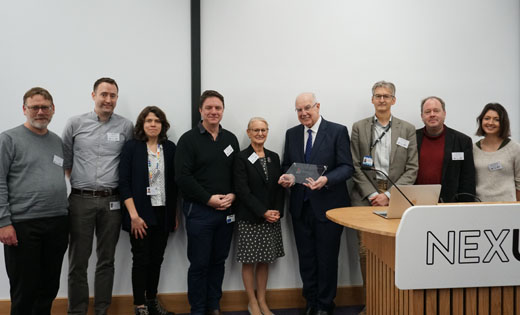 Pictured at the Astbury Centre event held at Nexus are (from left) Dr Arnout Kalverda, Dr James Ault, Dr Anastasia Zhuraleva, Professor Neil Ranson, Dr Susan Daenke, Vice-Chancellor Sir Alan Langlands, Professor Alexander Breeze, Professor Frank Sobott and Dr Rebecca Thompson
Pictured at the Astbury Centre event held at Nexus are (from left) Dr Arnout Kalverda, Dr James Ault, Dr Anastasia Zhuraleva, Professor Neil Ranson, Dr Susan Daenke, Vice-Chancellor Sir Alan Langlands, Professor Alexander Breeze, Professor Frank Sobott and Dr Rebecca Thompson
Astbury Centre opens its doors to European collaborators
The Astbury Centre Biostructure Laboratory has received prestigious recognition of its world-class technology and expertise in structural biology.
It has been awarded the status of an Instruct-ERIC facility. This partnership will allow researchers from Europe to access the electron microscopy, NMR and mass spectrometry facilities within the Astbury Centre and the Faculty of Biological Sciences.
By bringing together cutting-edge technologies and the technical knowledge of specialist facilities across Europe, Instruct is at the frontier of the integrative approach to structural biology, helping to drive developments in life science.
Instruct-ERIC is a European organisation comprising 10 centres of excellence in structural biology across Europe, funded by 14 member countries. It provides a single point of access to technology, training and expertise for integrative structural biology for academic and industry researchers. As the UK is a member of Instruct, academic scientists working here have full access to funding for research visits to our Instruct Centres and research sites.
The high-quality platforms at the Astbury Centre are a valuable addition to the Instruct technology catalogue, and align with Instruct-ERIC’s mission of supporting integrative structural biology. Researchers hosted a launch event at Nexus, the University’s innovation hub, to mark the occasion.
The Astbury Centre brings together researchers from across the University – largely from physics, the biological sciences and chemistry – to allow interdisciplinary approaches to be harnessed to understand the molecular basis of life. The Centre has outstanding expertise and research infrastructure in chemical biology, biophysics and all of the major techniques in structural molecular biology. Together, these approaches are combined with analyses of biological function with the ultimate aim of understanding the molecular basis of biological mechanisms in living cells.
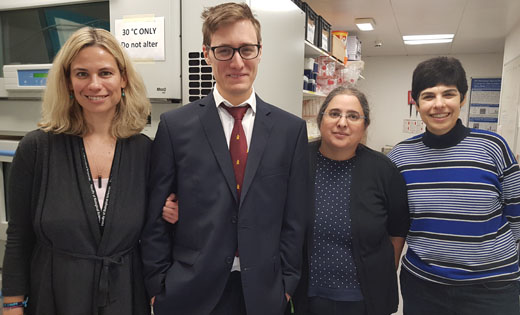 Pictured are Dr Patricija van Oosten-Hawle (far left) and Professor Netta Cohen (far right) with external examiner Anat Ben-Zvi at the viva for PhD student Daniel O’Brien
Pictured are Dr Patricija van Oosten-Hawle (far left) and Professor Netta Cohen (far right) with external examiner Anat Ben-Zvi at the viva for PhD student Daniel O’Brien
New research aims to delay progression of Alzheimer’s
Alzheimer’s is one of the most common forms of neurodegenerative diseases known today, affecting approximately 50 million people worldwide.
The pathogenic mechanism is characterised by the formation of toxic amyloid beta oligomeric species and aggregates, which disrupt neuronal function. One of the neuronal cell types most affected by amyloid beta are neurons that receive and transmit sensory signals. For example, loss of the sense of smell (olfactory dysfunction) is one of the earliest symptoms of Alzheimer’s in humans.
A similar loss of the sense of smell can be observed in a C. elegans model of Alzheimer’s, which expresses the human amyloid protein in the worm’s nervous system. But we don’t know which neuronal subtype loses its functional activity first as a consequence of amyloid beta-associated toxicity during Alzheimer’s and how neuronal function can be protected.
Using a C. elegans model of Alzheimer’s, a collaborative project between Dr Patricija van Oosten-Hawle (School of Molecular and Cellular Biology), Professor Netta Cohen (School of Computing) and Dr Steven Clapcote (School of Biomedical Sciences) funded by the National Centre for the Replacement, Refinement and Reduction of Animals in Research (NC3Rs) now aims to determine which neuronal circuit succumbs first to amyloid beta expression during progression of the disease and aging. This will provide novel insights into how the disease develops and progresses.
Dr van Oosten-Hawle said: “It is hoped the new knowledge will facilitate the development of pharmacological compounds that help sustain signalling activity of affected neurons for longer and so help delay further progression of the disease.”
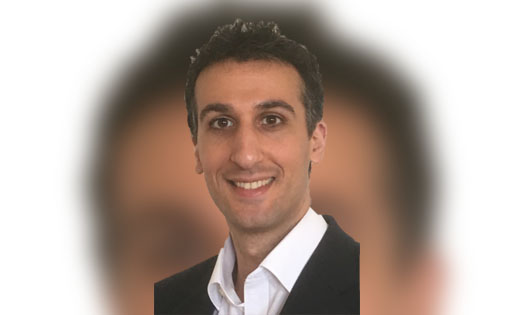 Helping improve survival rates for people suffering from liver cancer is the aim of a new five-year research programme led by Dr Adel Samson
Helping improve survival rates for people suffering from liver cancer is the aim of a new five-year research programme led by Dr Adel Samson
Funding secured to tackle liver cancer
More than £1 million has been secured to help improve survival rates for people suffering from liver cancer.
Dr Adel Samson, University Academic Fellow and Honorary Medical Oncologist at Leeds, has secured a £1.1m Cancer Research UK (CRUK) Clinician Scientist Fellowship (CSF) – the first cancer research laboratory-based CSF award in Leeds in more than a decade.
Only about five fellowships are awarded every year, with Dr Samson dedicating his five-year research programme to Rationalised Oncolytic virus-based immunotherapies for hepatocellular carcinoma.
Hepatocellular carcinoma is the most common primary cancer of the liver, with cases tripling since the 1990s due to the hepatitis C virus epidemic and rising obesity levels. Other causes include alcohol excess and the hepatitis B virus infection.
The five-year survival rate for hepatocellular carcinoma is currently just 12%, with few effective therapies.
Dr Samson said: “The fellowship will enable me to focus my research on improving survival for patients with hepatocellular carcinoma by developing personalised immunotherapy regimens, based on therapeutic viruses.
“Essentially, I am researching how ‘live’ therapeutic viruses can best be used to stimulate the immune system to attack liver cancer.
“The results from my fellowship will form the basis of a personalised joint laboratory and clinical trials programme for patients with hepatocellular carcinoma. The results will additionally benefit patients with other cancers.”
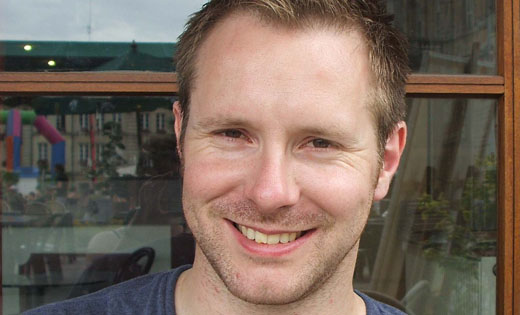 Securing a Medical Research Council grant will help Dr Stephen Griffin and his team investigate immunotherapy for liver cancer
Securing a Medical Research Council grant will help Dr Stephen Griffin and his team investigate immunotherapy for liver cancer
Grant will help investigate immunotherapy for liver cancer
A team of researchers have been awarded a grant to understand how the power of the immune system can tackle cancers.
Led by Dr Stephen Griffin, Associate Professor in the Leeds Institute of Medical Research (LIMR) and the Astbury Centre for Structural Molecular Biology, the team has secured a four-year £1.34 million project grant, awarded by the Medical Research Council (MRC). It will enable the team to study more about how immunotherapy can kick-start white blood cells to 'attack' a tumour. This is called an 'oncolytic virus'.
The novelty of this study is that the team has treated oncolytic virus so that it can no longer grow within the cancer cells, meaning it must activate the immune response directly. This works particularly well against experimental models of liver cancer, especially when combined with a drug that liver cancer patients already receive during their treatment, known as Sorafenib.
Dr Griffin said: “Finding new ways of treating liver cancer is important because it is the fastest-growing cause of cancer-related death world-wide.
“Understanding how combining the virus and Sorafenib kills liver cancer may lead to future patient benefit in a disease of hugely unmet clinical need.”
The team also includes Dr Adel Samson (see article above), Dr Liz Ilett (LIMR), Dr Andrew Macdonald (School of Molecular and Cellular Biology) and Professor Alan Melcher (LIMR).
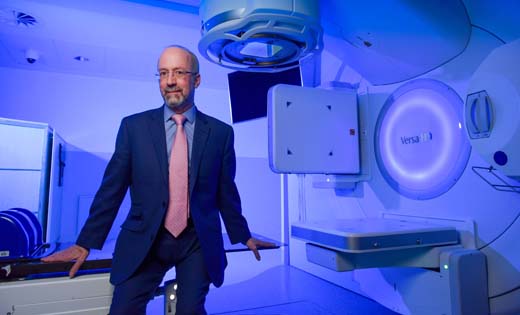 Professor David Sebag-Montefiore, who will lead the new Leeds radiotherapy centre of excellence, pictured in one of the radiotherapy suites at St James’s University Hospital, which will be involved in the research
Professor David Sebag-Montefiore, who will lead the new Leeds radiotherapy centre of excellence, pictured in one of the radiotherapy suites at St James’s University Hospital, which will be involved in the research
Leeds scientists lead next generation of radiotherapy treatments
Leeds scientists and clinicians have been awarded a major cash boost from Cancer Research UK (CRUK) to pioneer new radiotherapy technologies that could help more people in Yorkshire survive cancer.
Led by Professor David Sebag-Montefiore, experts from the University and the Leeds Teaching Hospitals NHS Trust are poised to receive £3.5 million during the next five years to fund advances in radiotherapy research, including the use of artificial intelligence (AI) with imaging technology.
Leeds has been chosen to be one of just seven Centres of Excellence in a UK-wide network, RadNet, which will accelerate advances in radiotherapy research. Other centres will be located in Manchester, Cambridge, Oxford, Glasgow and London.
Sir Alan Langlands, Vice-Chancellor at Leeds, said: “Achieving the status of a Cancer Research UK Centre of Excellence is important recognition of our overall commitment to excellence in cancer care and the science which underpins it, in particular the outstanding quality and impact of radiotherapy research in Leeds.
“Improving cancer outcomes is at the heart of our research strategy and radiotherapy plays a crucially important role in increasing survival rates for a broad range of cancers.”
Radiotherapy is a precise treatment given to patients on a daily basis. In its simplest form, it uses high energy X-ray radiation beams to selectively kill cancer cells by irreversibly damaging their DNA, while minimising the effect on the surrounding normal tissues.
Research at the Leeds Centre of Excellence will combine the use of AI, magnetic resonance imaging and new drugs with radiotherapy, focussing on patients with anal, rectal, prostate, liver and brain cancers.
Professor Sebag-Montefiore, from the School of Medicine, said: “We are very proud that Leeds has been awarded this grant to bring the next generation of radiotherapy treatments to patients sooner, helping to save the lives of more people with cancer in Yorkshire.
“Using artificial intelligence analysis of the MRI scans will help us to tailor future treatment for patients and reduce side effects, resulting in new, precise and personalised treatments – and a better quality of life afterwards – in the next five to 10 years.”
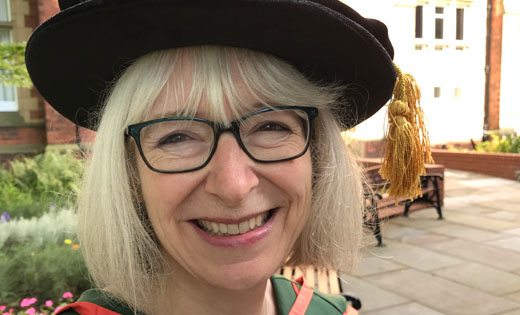 Assistance for pharmacist practitioner Dr Su Wood to research a problem seen in practice has led to national impact to reduce risks in prescribing when kidney function is reduced, particularly for older people
Assistance for pharmacist practitioner Dr Su Wood to research a problem seen in practice has led to national impact to reduce risks in prescribing when kidney function is reduced, particularly for older people
The power of a PhD
Assistance for a pharmacist practitioner to research a problem seen in practice has led to national impact to reduce risks in prescribing when kidney function is reduced.
In 2009, a pharmacist working in local GP practices, Su Wood, approached Theo Raynor, Emeritus Professor (School of Healthcare), to talk about a problem she was seeing in her practice. Older people were being prescribed some medicines inappropriately because of the test being used to assess how well their kidneys are working. She felt this was leading to harm, sometimes serious, from these medicines. The GPs were not at fault – they were simply using the test recommended in national protocols.
Researching whether there really was a problem in practice was suggested to give a robust, evidence-based focus, and that was how she came to undertake a PhD. Her studies did indeed show that a different kidney test should be used in older people – and this was published in the British Journal of General Practice last year.
Su, now Dr Wood, was invited to present her PhD findings to the British National Formulary (BNF) committee in 2017, and the recommendations for prescribing in renal impairment were updated that year. Then, last month, the UK’s medicines regulator – the Medicines and Healthcare products Regulatory Agency (MHRA) – issued a national alert, based on Dr Wood’s PhD research, requiring prescribers to use the appropriate test, particularly for older people.
Having been initially unsure about the benefit of doing a part-time PhD, given the time it was likely to take, Dr Wood’s experience has proved it was impactful to effectively highlight this issue of medicines safety.
Professor Raynor said: “In my view, this is a great example of the power of a PhD – where we can assist a practitioner, through a PhD, to research into a problem they see in their practice and, as a result, change that practice – in this case reducing the harm for older people taking some medicines.”
Dr Wood said: “I was initially unsure whether doing a part-time PhD would be the best way to highlight this issue of medicines safety I had seen in practice, given the time it was likely to take, but the research has led to more impact than I could have hoped for.
“More than half of all prescribing is for older people; as kidney function reduces with age, helping prescribers to apply dosing recommendations will help to reduce risk of harm from many medicines taken by this age group. My PhD research has given me the robust evidence to promote safe practice and has been useful for national guidance bodies.”
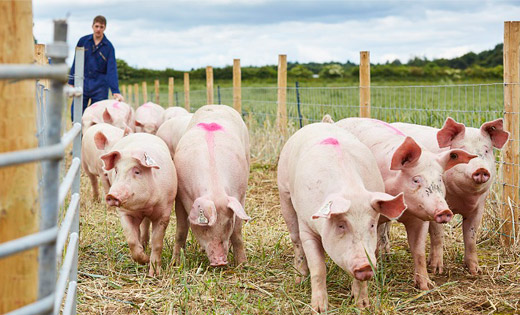 The National Pig Centre will be a leading research facility for improving the welfare of pigs, and the sustainability of the British pig industry
The National Pig Centre will be a leading research facility for improving the welfare of pigs, and the sustainability of the British pig industry
National Pig Centre opens
Precision nutrition and 24-hour monitoring will enable scientists to provide new insights for the pig industry following the opening of our National Pig Centre.
Scientists from a range of disciplines will use new state-of-the-art facilities to help improve the sustainability and efficiency of pig production.
The facilities make Yorkshire one of the best places in Europe for pig research.
The National Pig Centre will be a leading research facility for pig nutrition, behaviour, health and production system research – all themes identified by the livestock industry as central to improving quality, productivity and future competitiveness.
Professor Lisa Collins, academic lead for the PigSustain project and Head of the School of Biology, said: “This new centre allows us to expand our work to improve the welfare of pigs, and the sustainability of the British pig industry.
“Our aim is to lower the environmental footprint of pig farming whilst ensuring that high welfare standards are maintained.”
The indoor facility is equipped with CCTV throughout, permitting round-the-clock observations of individual pigs’ behaviour at all stages of production.
The Centre has been launched in partnership with Centre for Innovation Excellence in Livestock (CIEL), which has invested £4.5 million with funding from Innovate UK, the UK’s Innovation Agency.
The facility has also been supported by a generous donation from Leeds alumnus Nigel Bertram. Named in his honour, the Nigel Bertram Visitor Centre features conference and meeting facilities, offices and a live CCTV feed from the indoor pig unit.
Sir Alan Langlands, Vice-Chancellor, said: “Leeds is proud to be working in a number of ways, at home and internationally, to improve food security and the sustainability of the agricultural sector.
“The National Pig Centre will provide a key national resource for industry to work in partnership with the University to develop innovative and practical solutions that make a positive contribution to the economy, environment and society.
“We are hugely grateful for the strong support we have received from CIEL and Nigel Bertram, and the leading edge work of Helen Miller, our Professor of Animal Bioscience, in developing this facility.”
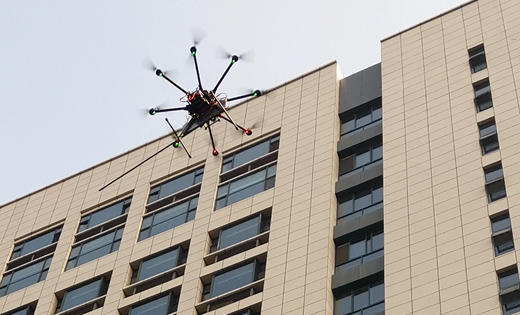 Emergency workers could use the WideSee drone for rescue operations
Emergency workers could use the WideSee drone for rescue operations
Drone wireless system helps rescue workers ‘see’ inside buildings
Engineers have developed a prototype drone-mounted wireless scanning system, which can fly up the outside of a high-rise building and detect the whereabouts of people who may be trapped inside.
The system – known as WideSee – has been developed in a joint collaboration between engineers at Leeds, the University of Massachusetts and Northwestern University in Xi’an, China.
The technology has been designed for use by emergency workers involved in search and rescue operations during a fire or if a building collapses.
In a paper presented at the SensSys ‘19 conference in New York, the researchers say the prototype device is capable of scanning deep into a building. Many existing wireless systems have a range limited to just a few metres.
The scanning device uses harmless, long-range radio waves, which are able to penetrate concrete walls half-a-metre thick.
Dr Zheng Wang, Associate Professor in the School of Computing at Leeds, said: “There are limitations to the existing equipment that rescue workers can use when they are conducting search and rescue operations.
“Heat-seeking cameras can identify the heat being radiated from a human body, but in a blaze there is a high chance the cameras would be incapable of picking out the heat being generated by someone trapped in the building because of the more intense heat being given off by the fire.”
The WideSee system works like radar. Signals sent from the drone pass into the building and rebound off objects. The rebound signal – picked up by a receiver on the drone – are altered by the objects they have bounced off. In effect, they are carrying the ‘signature’ of the objects inside the building.
Information from the drone is remotely sent back to a computer being monitored on the ground. Software processes the signals and gives the operator details about occupants in the building.
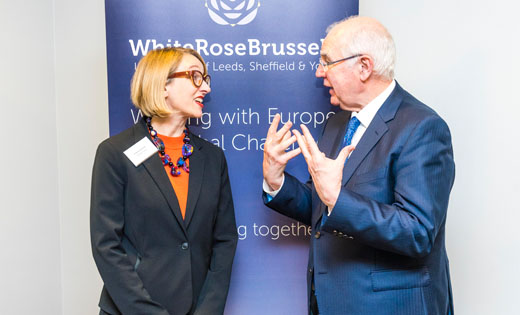 Professor Fiona Smith and Sir Alan Langlands at the White Rose Brussels Sustainable Food event
Professor Fiona Smith and Sir Alan Langlands at the White Rose Brussels Sustainable Food event
Helping address global issues around sustainable food
Senior figures from Leeds played a pivotal role in a top-level European event to address the issues surrounding sustainable food.
The White Rose Brussels office held a Sustainable Food: A Systems Approach for EU Policy discussion in the heart of Brussels’ European Quarter earlier this month.
The event was attended by the three White Rose Vice-Chancellors, including Sir Alan Langlands from Leeds, as well as Yorkshire and the Humber MEP Shaffaq Mohammed.
Fiona Smith, Professor of International Economic Law and Associate Director for the AgriFood Supply Chains, Global Food and Environment Institute (GFEI), at Leeds, as well as N8 Chair in Agri-Food regulation, was among the speakers.
She presented the trade perspective within the food system, arguing that food supply is controlled by global value chains, which are sustained by the World Trade Organization (WTO) and other such regulations.
New agreements have facilitated a growth in the trade of agricultural products, which tripled between 2000 and 2018. However, Professor Smith outlined several of what she believed are trade risks linked with sustainable food flows – notably, that the current rise in nationalism and trade wars poses threats to the stability of trade agreements and the global value chain by increasing/decreasing tariffs on products from a specific geographical location.
In terms of sustainability, Professor Smith warns that the proliferation of private standards of sustainable policies means there is less capacity to realistically measure how sustainable a product is and to hold companies to account for this – made more difficult by the complexity and number of actors within the supply chain.
The event was a brilliant opportunity to showcase research excellence from Leeds, also providing the chance to reaffirm our commitment to continued close collaboration with our EU partners, whatever the outcome in UK politics during the coming months.
 Stanley Ellis, SED fieldworker, with tape recorder and microphone with informant, Tom Mason, near Ilkley
Stanley Ellis, SED fieldworker, with tape recorder and microphone with informant, Tom Mason, near Ilkley
Can you tell ferntickles from branny-speckles?
A small army of volunteers is to be recruited to help update the most comprehensive survey of England’s dialects ever undertaken, thanks to an injection of funding.
The University's Dialect and Heritage project has been awarded £530,500 from The National Lottery Heritage Fund to open up the extensive Leeds Archive of Vernacular Culture (LAVC) to the public.
The archive includes the ground-breaking work of the Survey of English Dialects, carried out by nine intrepid fieldworkers in the 1950s and held in our Library’s Special Collections.
The survey will now be updated and made available online for the first time, with the help of volunteers recruited and trained as oral history and dialect fieldworkers and transcribers.
They will follow in the footsteps of the dialect pioneers, who set out from Leeds 70 years ago to record and map dialects from all corners of the country. But unlike the original survey, they won’t only be looking for “old men with good teeth”.
Through a series of local community outreach events and working with five partner museums from across the country, the Dialect and Heritage project will invite people to get involved as a volunteer or by sharing their dialect – regardless of location, background, age or gender.
Researchers are also looking for descendants of the people who took part in the original Survey of English Dialects, which ran from 1946-1978, or with connections to the Institute of Dialect and Folk Life Studies, which was in operation between 1963 and 1983.
“If you, your parents, grandparents or other relatives have a connection to these historical dialect studies, the project would like to hear from you,” said Dr Fiona Douglas, from the School of English at Leeds, who is leading the project.
 Two Leeds academics will be working in partnership with organisations such as the BBC and the Financial Times to investigate the use of generic visuals in the news
Two Leeds academics will be working in partnership with organisations such as the BBC and the Financial Times to investigate the use of generic visuals in the news
Taking stock of generic news images
The Arts and Humanities Research Council (AHRC) has awarded £730,000 to two Leeds academics to work in partnership with organisations such as the BBC and the Financial Times to investigate the use of generic visuals in the news.
Beginning in October 2020, research by Professor Chris Anderson and Dr Giorgia Aiello (both from the School of Media and Communication) – entitled ‘Generic visuals in the news: the role of stock photos and simple data visualisations in assembling publics’ – will last for three years, and will be run in partnership with Professor Helen Kennedy from the University of Sheffield.
The project will examine the role that generic visuals, such as stock photography and simple data visualisations, play in bringing groups of people together around shared interests and concerns, activating citizens to care (or not) about particular issues, making possible (or not) various forms of engagement, including democratic decision-making, and in spreading or inhibiting the spread of disinformation.
Dr Aiello said: "Images with standardised formats and appearances, like stock photos and simple data visualisations, are incredibly pervasive in news media. However, these generic visuals are also usually overlooked. Worse than that: they are often dismissed or derided, precisely because of their banal, clichéd nature. We think that dismissal is a mistake, and this is something we need to pay more attention to.”
Dr Anderson added: "The funding provided by the AHRC for this this project will enable us and our external partners – which include the Financial Times, the BBC and Trinity Mirror/Reach – to shed light on a really under-studied aspect of news production and consumption. And it's one that is increasingly central to how ordinary people engage with major social issues and forms of democratic decision-making.”
Research spotlight
Articles published on the University’s corporate website during November have also highlighted a number of major research success stories, including:
- Rare plant species face extinction
- Drill or no drill – ‘the end of the dentist’s dilemma’
- Unpredictable evolution in brain tumours
- Skipping breakfast linked to lower GCSE grades
- Greenhouse gas nitrous oxide is on the rise
- Bowel cancer rates after colonoscopy vary by provider
- Vitamin D dials down the aggression in melanoma cells
- Worker robots that learn from mistakes
- 'Wolves in sheep's clothing' – the superbugs outsmarting lab tests; and
- Going with the flow: the
'hidden science' of fluid dynamics.
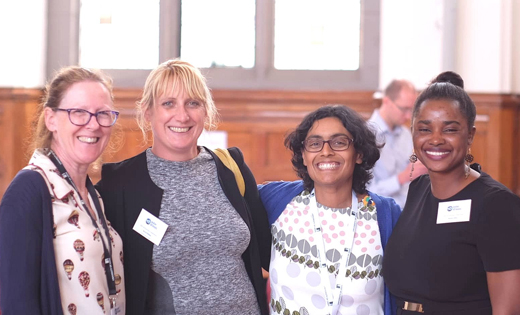 Professor Barbara Evans (School of Civil Engineering), Dr Ann Mdee (Associate Professor in the School of Politics and International Studies), Dr Lata Narayanaswamy (Lecturer in International Development in the School of Politics and International Studies) and Alesia Ofori (a water@leeds PhD candidate) celebrating the launch of the Water Woman Award during the 10th anniversary event for water@leeds held on campus earlier this year
Professor Barbara Evans (School of Civil Engineering), Dr Ann Mdee (Associate Professor in the School of Politics and International Studies), Dr Lata Narayanaswamy (Lecturer in International Development in the School of Politics and International Studies) and Alesia Ofori (a water@leeds PhD candidate) celebrating the launch of the Water Woman Award during the 10th anniversary event for water@leeds held on campus earlier this year
New award honours women in science
A new award has been launched to recognise the achievements of women in science and their power to inspire others.
The Water Woman Award has been developed by water@leeds in partnership with the Faculty of Environment Athena SWAN team.
By rewarding achievements by women whose work contributes to the scientific objectives of water@leeds in securing competitive research funds, producing world-class research or achieving significant societal impact, the Award aims to highlight their efforts in an academic world in which the hurdles are still greater for females.
The Award is based on two equally-weighted criteria – the nature of the achievement and its potential for empowering and inspiring other women into following their example.
It is open to all employees at Leeds identifying as women and from all backgrounds.
Dr Clare Woulds, Athena SWAN team leader for the Faculty of Environment, said: “It is important to raise the profile of successful women in our institution to provide role models, and to facilitate peer-to-peer mentoring.
“We hope in this way to enable all of our colleagues to achieve their goals.”
The Award will be split into four categories:
- Research Funding – in recognition of securing significant competitive research funding (the level of significance will be considered in relation to the discipline and area of work and does not include a specific threshold for the value)
- Research Excellence – in recognition of outstanding research (e.g. academic publication or equivalent)
- Societal Impact and Knowledge Transfer – in recognition of translating research and innovation; and
- Academic support – in recognition of critical support provided to the achievement of any of the above (e.g. through administrative, organisational or technical support).
Winners will receive £1,000 each, transferred to their staff development account.
Applications or nominations can be made by submitting a form available on the water@leeds website by 2pm on Wednesday 15 January 2020.
Research Development Fund 2019 applications open
Awards of up to £500 are available to support patient/public/stakeholder involvement or engagement in the research design stage.
Applications are now open to the next round of the Research Development Fund (RDF), with a deadline of Friday 10 January 2020.
Since September 2017, there have been more than 40 applications under the Awards Scheme with in excess of £8,000 committed to date and more than £5,000 paid to successfully completed projects.
On the back of successful RDF awards, 19 proposals have been submitted to various funders of which eight have received research funds of more than £3.6 million – a success rate of 42%.
The awards are supported by Wellcome Trust ISSF funding.
Visit the Public Engagement (PE) website or contact the PE team for further information.
Gale Digital Scholar Lab
Is your research concerned with digital humanities, text analytics and corpus linguistics?
Do you want to incorporate digital humanities techniques into your teaching or research?
Are you interested in a better way to compile, analyse and manage Gale primary source content?
On Monday 16 December, the Library Service is hosting a vendor-led demonstration of Digital Scholar Lab – a cloud-based scholarship tool, which allows you to generate bespoke content sets of relevant research material and apply analytic tools, such as clustering or topic modelling.
This will be followed by a hands-on session, where you will get the opportunity to explore digital archives in new ways, creating content sets and running your own computational analyses.
The event is being held at 2pm in Level 10 Teaching Room, Edward Boyle Library. Contact Ian Jennings for further information or to indicate an interest in attending.
Be Curious – save the date
Saturday 28 March 2020 is the date for the fifth instalment of the hugely popular Be Curious research open day. Free, interactive and fun activities are planned to engage the general public in the pioneering studies undertaken at Leeds. See For Staff for future updates.
How to feature in future round-ups
Please contact Internal Communications if you or one of your colleagues would like to appear in this monthly feature.
Posted in: University newsResearch and innovation